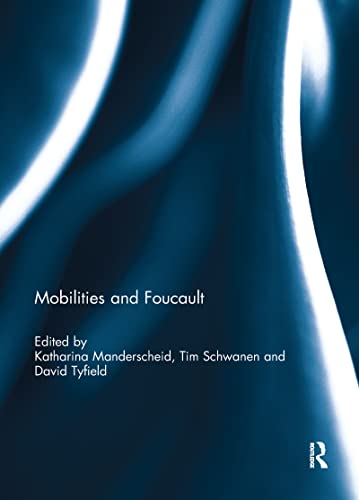Discussing Mobility within Foucauldian Thoughts
From the interest in Foucauldian thoughts and Mobility, this book gathers remarkable discussions on the social sciences. Although some researchers enthusiastically connected Foucauldian thoughts and Mobility, most of the discourses on these two traditions have been biased and unsystematic. However, research on Foucault can contribute critically to thinking about Mobility management issues in modern society, and Mobility research can expand a new perspective on Foucault.
First, increasing interdependencies between Mobility systems (traffic, tourism, trade, internet). Second, inevitable consequences of natural disasters such as unwanted viruses, wildfires, the (provisional) proliferation of crime, and the globalizaton. Third, threats to Mobility by climate change, oil depletion, energy security issues, war, and terrorism. Finally, governance logic on the choice and responsibility, economic (re)deployment under neoliberalism. These are problem increasing on modern society.
Why Foucault again?
Foucult’s insight and concepts moved with his thoughts over time. Attempts to fix its meaning or definition must fail. First, mobility research targets Foucault’s thoughts and writings about knowledge formation from this perspective. Applying this perspective to climate change issues or urgent issues such as the demand for sustainable mobility (walking, biking, public transportation, or railway, etc.) can explain why it continues to be constructed and understood mainly through language and inference in economics, engineering, and psychology. It is to carefully examine how knowledge as a form of discourse “reorganizes itself into a new from or entity.”Second, concerning Foucault’s second focus, the normative framework of behavior (the ‘microphysics’ of power and extensive analysis of power techniques), mobility research examines the normality’s rule, composition, and effectiveness. This relates to the big data collected through web browsers, mobile phones, and transportation cards. Technology development raises complex issues about privacy and surveillance and brings new technology that governs and constructs ‘dangerous’ mobility, making an unprecedented normative rule for social classification. Third, Foucault’s interest in the potential aspect of the subject links to the fact that various forms of mobility in research generate overall satisfaction, self-esteem, and genuinely positive emotions. In addition, mobility practice offers countless opportunities to relocate or resist the social code embedded in contemporary technology about oneself. Seeing mobility as a complex mixture of domination and self-making and trying to confirm the relative importance of each individual in different times and spaces enriches mobility research.
Why Foucault Now ?
For various reasons, mobility research that introduces Foucauldian concepts is increasing systematically. Most importantly, it could be a temporal coincidence, english translation of Foucault’s Collège de France lecture series is overlapped with the emergence of mobility research in English-speaking countries. Many issues such as subjectivity, governance, and circulation discussed in this lecture have also become central issues in the mobility paradigm. Therefore, attention to Foucault’s lectures has influenced mobility research and numerous fields of social science. Moreover, ‘Foucault’ allows us to analyze the mobility device, such as knowledge, a system of scientific facts, the technology of power, classification, hierarchy, normative rule, and the totality of subjectivity. Foucault’s work on ethics and subjectivity has also led to a more systematic placement of power and governance issues in researching of individual experience in im/mobility and moving life.
How Foucault?
There are two ways. One is to study Foucault’s writing for mobility discourses, and the other is to work on Foucauldian subject or concept. The research goal is to contribute to two traditions by developing Foucault’s thoughts or clarifying mobility. This is the way of approaching that can be found in this book. These approaches lead to various insights, a clear advantage that can emerge from the conversation between the two research traditions. This leads to insights from various issues, perspectives, and work that provides mutual information and shows significant convergence and resonance.



